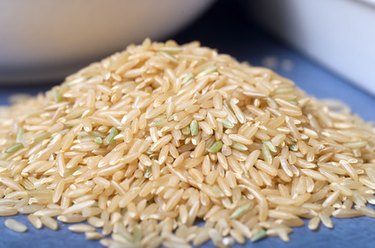Things You'll Need
Shovel
Garden hose
Tarp (optional)
Earthworms (optional)

You can compost rice hulls to dispose of them safely and improve the quality of composted soil. Rice hulls are a biproduct of rice production that is generally removed and discarded prior to packaging. Toxins and pollutants are released into the air when rice hulls are burned. A balanced mix of rice hulls and decaying other organic material will decompose more rapidly than the hulls alone. Create nutrient-rich organic soil by composting rice hulls to turn a liability into a resource.
Step 1
Use a shovel to build a mound where layers alternate between single layers of organic compost like manure or food waste and double thick layers of rice hulls. Stacking the material vertically limits the oxygen supply to some layers to encourage anaerobic, or without oxygen, decomposition.
Video of the Day
Step 2
Spray the mound of decomposing rice hulls and organic material with a hose to keep it moist. Stop spraying when you notice most of the water is running off.
Step 3
Cover the damp compost mound with a tarp to help it hold in heat. The bacteria that speed decomposition thrive at temperatures between 50 and 150 degrees Fahrenheit. The tarp is not necessary if ambient temperatures are within the optimum range and you are able to keep the pile moist with regular water application.
Step 4
Turn the pile by scooping and flipping the debris with a shovel once or twice a month. Add more rice hulls or food and plant waste to the mound when it is turned over to continually feed the microbes and encourage aerobic, or oxygenated, decomposition.
Step 5
Introduce earthworms to the mound to accelerate the decomposing process of the rice hulls. Moving the mound onto a plastic tarp generally keeps the worms from leaving the mound. Leave a worm-filled compost mound uncovered.
Tip
Rice hulls may take a year or longer to break down without the use of earthworms. The worms speed the decomposition process up by approximately four months. The composting process is finished when the materials in the pile are indiscernible as individual pieces and simply look like dirt.
Video of the Day